This text was produced for ProPublica’s Native Reporting Community in partnership with The Salt Lake Tribune. Join Dispatches to get tales like this one as quickly as they’re revealed.
Reporting Highlights
- Excessive Suicide Price: U.S. farmers are 3.5 occasions extra more likely to die by suicide than the final inhabitants. In Utah, they die by suicide on the third-highest fee by vocation within the state.
- Non permanent Assist: A federal program providing Utah farmers free remedy was so profitable that it ran out of cash in 4 months. However lawmakers have chosen to not proceed funding it.
- Stressors Dealing with Farmers: Farmers expertise distinctive stressors, together with fluctuating market costs, unpredictable climate and the expectation they deal with psychological well being points on their very own.
These highlights had been written by the reporters and editors who labored on this story.
Josh Dallin spends his workdays speaking to Utahns who elevate cattle and develop crops, and knew that many had been in misery. Everybody from neighbors to fertilizer sellers to tools suppliers had been telling him they had been nervous {that a} farmer or rancher they knew was liable to suicide.
Then in 2023, with cash allotted by Congress, Dallin had new assist to supply: As govt director of an agriculture heart at Utah State College Extension, he had scores of $2,000 vouchers that Utahns working in agriculture may use to get free remedy.
Dallin feared nobody within the sometimes stoical farming group would take him up on the federally funded supply. He was unsuitable.
Farmers and ranchers throughout Utah rapidly accepted the cash, which ran out in simply 4 months — properly earlier than he anticipated — and his workplace needed to begin turning folks away. It satisfied Dallin of the deep want within the state’s agricultural communities, and folks’s openness to getting assist when value will not be a barrier. “I need you to know,” he recalled one voucher recipient telling him, “that this saved my life.”
“It was heartbreaking,” he stated, to must put “the brakes on this system.”
The cash for the vouchers was a part of a one-time $28 million allocation despatched to states to assist People producing meals deal with the additional stresses of the coronavirus pandemic. Any state that utilized to the U.S. Division of Agriculture was awarded as much as half 1,000,000 {dollars} — which was used to carry trainings, begin hotlines staffed by psychological well being employees and, like in Utah, present remedy.
With that funding now largely spent, leaders in some states have tapped state funds or leaned on personal donors to make sure psychological well being help continues.
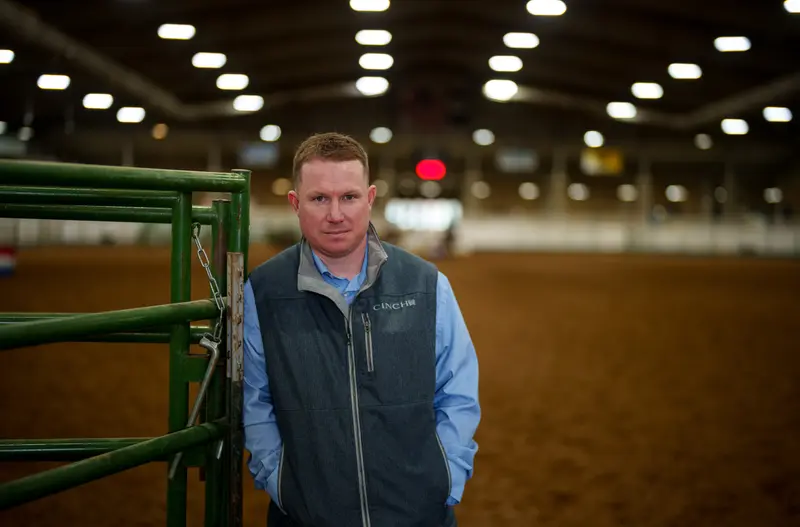
Credit score:
Trent Nelson/The Salt Lake Tribune
Utah has not — and, at the least based on one legislator, has no intention to take action.
Republican state Sen. Scott Sandall, a third-generation rancher and farmer who’s the Government Appropriations Committee vice chair, criticized Congress for making a program with a one-time increase of cash, saying that with out ongoing funding it was destined to fail.
“The way in which they set it up,” he stated, “was finally to have it go away.”
The Salt Lake Tribune and ProPublica reached out to Gov. Spencer Cox — himself a farmer who has advocated for higher psychological well being sources within the state. In 2022, he acknowledged in a Utah Farm Bureau article that poor psychological well being was an issue affecting the state’s farmers and stated he hoped investments in rural psychological well being may higher help the agriculture trade. His workplace didn’t reply to interview requests for this story.
Farmers in the USA are 3.5 occasions extra more likely to die by suicide than the final inhabitants, based on the Nationwide Rural Well being Affiliation. Utah’s suicide fee has persistently been among the many nation’s highest, and farmers and ranchers wrestle with the volatility that comes with working within the dry mountain area. They die by suicide on the third-highest fee by vocation within the state, based on state knowledge, behind miners and development employees.
Fluctuating market costs, unpredictable climate and a stigma that farmers needs to be “robust” and might deal with their psychological stress themselves had been fixed pressures described by greater than a dozen folks The Tribune and ProPublica interviewed — farmers and ranchers, their households and those that help psychological well being packages for them.
The American Farm Bureau has emphasised in current information releases that the Trump administration’s shifts in coverage round tariffs and federal grant funding have elevated the uncertainty confronted by America’s farming communities — a inhabitants that overwhelmingly backed President Donald Trump within the 2024 election, based on an evaluation by the nonprofit newsroom Examine Midwest.
Trump acknowledged in his March speech to Congress that tariffs specifically could deliver “a bit little bit of an adjustment interval” for America’s farmers however stated that he believes they are going to finally assist by lowering competitors from producers in different nations.

Credit score:
Win McNamee/Pool Picture through AP
“Our farmers are going to have a area day proper now,” Trump stated. “So, to our farmers, have numerous enjoyable. I like you, too.”
Federal funding to help farmer psychological well being is tied up with ongoing debates over the Farm Invoice, a sweeping package deal of laws that Congress has been unable to maneuver ahead because it expired in 2023. The USDA stated will probably be able to implement psychological well being packages if federal lawmakers applicable more cash for them.
Sandall, the state legislator, stated he is aware of that the stress of working in an unpredictable trade like agriculture could cause nervousness and psychological well being challenges. However when he was offered with the info concerning the excessive suicide charges in Utah agricultural communities, he stated he doesn’t suppose Utah lawmakers can be concerned about funding a program meant to assist one particular career. There’s “a lot demand” for psychological well being help all through the state, he stated, including that concentrating on sure professions would create a “battle for funding.”
“Whether or not they’re a mechanic,” he stated, “or whether or not they’re a college trainer, or a physician, or somebody in agriculture, I simply suppose it might be a bit onerous to begin separating out and creating simply psychological well being packages for particular person industries.”
“We Carry the Burden”
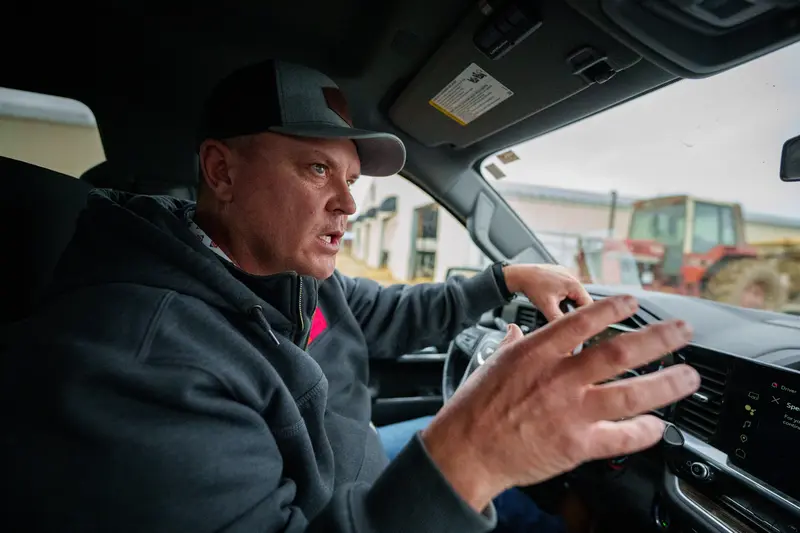
Credit score:
Trent Nelson/The Salt Lake Tribune
The stress of proudly owning a dairy fell on Mitch Hancock’s shoulders in a single day after his father-in-law died by suicide in 2014. Hancock’s father-in-law hadn’t shared together with his household that he was in disaster.
Psychological well being, Hancock stated, isn’t a subject mentioned typically amongst farmers. “I feel we wrestle in quiet.”
For Hancock, too, there was no time for him to grieve. It was early August, and there have been nonetheless two extra cuttings of alfalfa that wanted to be made, one other month of harvesting corn and the day by day wants of milking cows.
He had been concerned with the dairy as a result of his father-in-law had been hoping to transition into retirement, Hancock stated. Nonetheless, “I had by no means pushed a tractor,” he stated. “By no means pushed a semi in harvest, by no means pushed a chopper. By no means carried out any of that. So it was very a lot, ‘Effectively, let’s determine it out as we go.’”
That was greater than a decade in the past. Hancock and his spouse have run NooSun Dairy since on 2,400 acres of land in Field Elder County, the place the snow-capped Wasatch Mountains stretch to the east and the Nice Salt Lake might be seen previous acres of fields and houses wanting west.
When he speaks, Hancock is taciturn and easy, a skilled civil engineer who takes a practical strategy to operating the dairy farm. However he has new perception now into what his father-in-law confronted, he stated, a weight far heavier than simply having a profitable enterprise. He has workers who want these jobs and neighbors who rely on him to purchase their crops to feed his cows.
“We feature the burden to guarantee that we are able to handle all of these round us like we all the time have,” he stated, “even in occasions of low milk costs.”
However with the ability to pay the dairy’s payments might be difficult, Hancock stated, as a result of the worth he can promote at can fluctuate. Milk worth rules are set by a fancy authorities course of that may trigger costs to vary as typically as day by day. When costs are risky, Hancock stated, “it’s onerous to look previous the doomsday.”
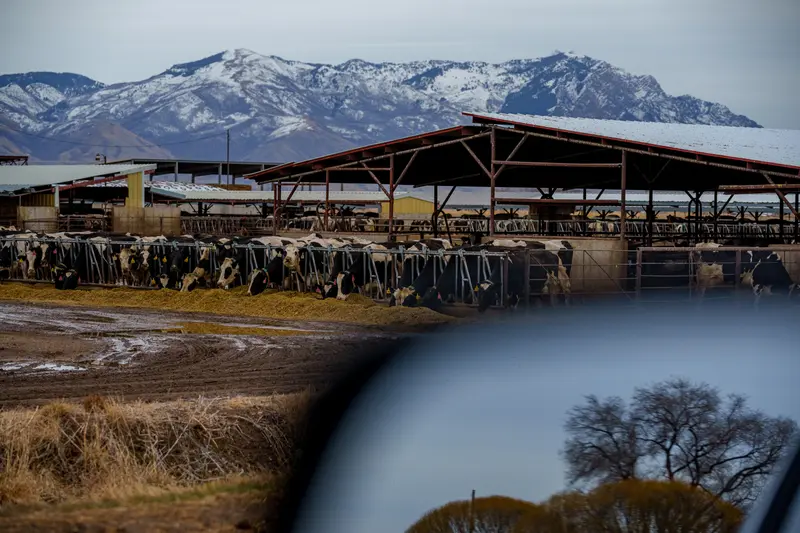
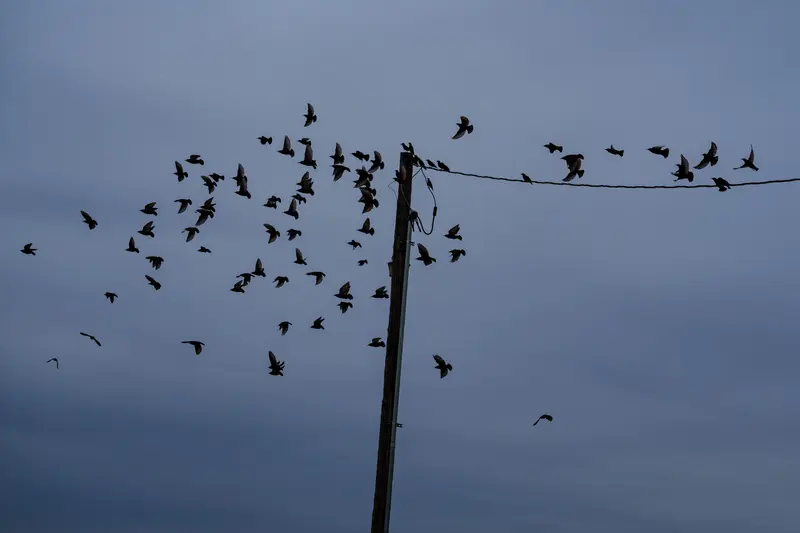
Credit score:
Trent Nelson/The Salt Lake Tribune
Like fluctuating market costs, farmers face different components of their work they’ll’t management: the worth of fertilizers and tools, how a lot it rains or whether or not animals get sick. And their workdays are lengthy.
As well as, in Utah and the arid West, farmers and ranchers fear about water, stated Craig Buttars, the outgoing Utah Division of Agriculture and Meals commissioner. In a single current 12 months when rainfall was notably scarce, he recalled, ranchers scrambled to search out sufficient feed and needed to haul water to cattle — a lot of which graze on distant public lands.
“That simply added one other stage of stress,” he stated. “It looks as if these issues can simply add on to at least one one other. And sooner or later, producers, typically they only really feel like, ‘Why am I doing this?’”
Some farmers have additionally felt villainized by the general public for his or her water use, together with by a current examine that prompt that farmers want to chop again or cease rising altogether so as to assist cease the shrinking of Utah’s Nice Salt Lake. This takes a toll, stated Caroline Hargraves, the advertising director with the state agriculture division. “I can’t inform you how typically I hear folks say that farmers ought to simply give up. Like we shouldn’t even develop our personal meals,” she stated. “Simply actually demonizing anybody for his or her water use.”
Chris Chambers is an alfalfa and hay farmer in northern Utah who sells his crop to native cattle producers. He stated it’s irritating to learn on-line feedback posted in response to information articles about declining lake ranges from individuals who suppose farmers ought to hand over their water rights or cease farming.
“It’s your livelihood,” he stated. “Water is the important thing, and we’ve obtained the senior precedence rights to make use of the water from the state of Utah. And now we’re unhealthy guys for doing it? We really feel like we’re doing a very good service for feeding folks.”
In Rural Utah, Few Therapists and Extra Weapons
In a state that has persistently increased charges of self-reported despair than the remainder of the USA, residents in rural areas — the place many farmers and ranchers stay — face distinctive challenges in getting assist. Within the two counties which have the very best quantity of farmland within the state, every has about one therapist for each 550 folks, based on County Well being Rankings, which pulls knowledge from the Nationwide Supplier Identification registry. (The nationwide ratio is one therapist for each 300 folks.)
With out that kind of specialised care, docs in rural areas typically rely solely on prescription medicines, stated Tiffany McConkie, a rancher in northeastern Utah who additionally works as a nurse at a clinic within the city of Altamont, in a three-room medical workplace adorned with photographs of sun-drenched farm landscapes. It’s the place folks can go for common medical care in their very own city within the Uintah Basin, a rural space recognized for its oil manufacturing and agriculture.
But when somebody is searching for behavioral well being therapy from that very same medical system, Uintah Basin Healthcare, the one two therapists on workers work at a bigger medical clinic that’s about 20 miles away, based on the well being care system’s on-line supplier listing.
McConkie stated some folks hesitate to ask for psychological well being care, telling her that they’re afraid of being medicated or that well being care employees will name the police they usually’ll be put right into a “psychological residence.”
“And that’s not the case,” she stated. “We simply wish to get them the assistance they want.”
The place rural Utah lacks easy accessibility to therapists, there’s additionally an abundance of firearms — and a better suicide fee in contrast with city areas, based on a 2018 Harvard examine. That examine discovered that the elevated suicide fee in rural Utah will not be as a result of folks there try suicide extra typically however as a result of they’re utilizing weapons, that are extra deadly than different strategies.
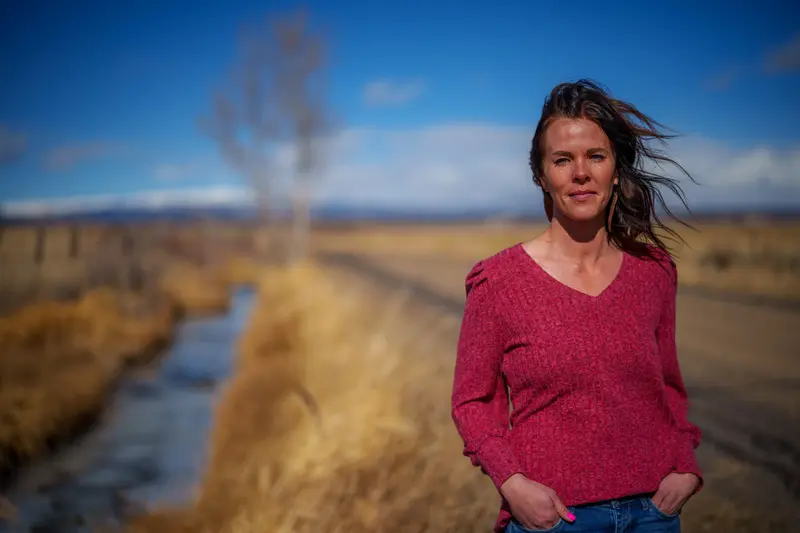
Credit score:
Trent Nelson/The Salt Lake Tribune
Within the basin the place McKonkie lives, the native state-run psychological well being clinic has responded to these statistics by specializing in gun security, handing out gun locks and safe ammo containers at gun reveals. In addition they journey to grease fields to do suicide prevention trainings with employees, an effort to satisfy their most at-risk inhabitants — middle-aged males — the place they’re.
“It has required some creativity on our half,” stated Catherine Jurado, who works at Northeastern Counseling Middle, including that being in a smaller rural space permits them higher alternatives to create relationships. “Who else in the USA thinks, ‘I must go to a beef expo to do suicide prevention?’”
Looking for a Method Ahead
The shortfall in funding for farmer psychological well being has been occurring for years. In 2008, Congress created the federal Farm and Ranch Stress Help Community however, for greater than a decade, put no cash into it. The community finally was funded as a part of the 2018 Farm Invoice, however its annual $10 million covers your complete nation throughout 4 regional workplaces and at this time typically doesn’t help particular person remedy.
For the reason that Farm Invoice expired in September 2023, Congress has been unable to agree on a brand new legislative package deal, nor did it move a proposed invoice final 12 months to provide $5 million extra in funding for the Farm and Ranch Stress Help Community. Proper now, the community has continued to be funded by means of short-term extensions.
When the pandemic-era funding injected a brand new surge of cash on the state stage in 2021, Utah’s agriculture division and Utah State College Extension — the state’s land-grant college — jumped on the alternative.
The 2 organizations used among the cash at first for an academic podcast and on-line stress programs. And in 2023, they paid for remedy for about 240 farmers and ranchers. There are about 33,000 producers in Utah, based on 2022 Census of Agriculture knowledge, most of whom work different jobs apart from farming, which makes up almost 3% of the state’s financial system. As is the case all through the USA, most Utah farms are family-run.
Buttars, the Utah agriculture division commissioner, stated he was stunned by how many individuals sought the remedy vouchers.
“It actually did wake me as much as the variety of folks we now have within the state, in our agricultural group, that felt the necessity for such a program,” he stated.
Dallin, with Utah State, stated well being care suppliers reported that these utilizing the vouchers had been bettering, and that they had been receiving optimistic suggestions from those that went to remedy. However the cash ran out greater than a 12 months in the past, and this system has been halted.
Within the absence of federal funds, some states have locked in state funding or personal donations to maintain supporting their farmers.
In Michigan, a program providing free remedy and on-line stress programs has been in place for almost a decade, based on Remington Rice with Michigan State College Extension. He stated state agriculture leaders advocated for this system after seeing misery amongst dairy farmers.
“Agriculture is a pillar of society,” Rice stated. “No farmers, no meals. … And so we have to tackle a problem that threatens our meals provide.”
Extra not too long ago, he stated, a non-public enterprise — an organization that makes cherry merchandise — reached out to donate a portion of its gross sales to assist pay for remedy.
In Washington, a non-public donor — from a farming household who misplaced somebody to suicide — has supplied funding for no-cost remedy periods for farmers and ranchers, stated Don McMoran, who works at Washington State College Extension and is the Western regional lead for the nationwide Farm and Ranch Stress Help Community.
In Utah, those that ran the remedy voucher program have been hesitant to strategy lawmakers for state help.
Hargraves, with the state’s agriculture division, stated it may be robust to get state legislators to fund new packages. And Dallin stated his workplace has shied away from approaching legislators as a result of the cash can be earmarked as a part of the upper schooling finances attributable to its affiliation with the college. Utah’s legislative management has reduce $60 million in funding from the general public increased schooling system this 12 months — the largest finances reduce to varsities right here in at the least a decade.
For the reason that remedy voucher program ended, USU Extension has continued to run consciousness campaigns encouraging farmers to put money into their psychological well being care. And the Utah Division of Agriculture and Meals has additionally launched psychological well being workshops into some certifications and programs that farmers and ranchers enroll in.
Dallin stated his workplace has additionally been working with the College of Utah — a well being analysis college that runs its personal hospital system — to attempt to accumulate survey knowledge to show the voucher program’s effectiveness as they attempt to drum up more cash sooner or later. He stated he hopes by partnering, they’ll lean on the opposite college’s medical experience and designation as a well being care system.
“I actually imagine,” he stated, “that if the federal government or if some group had been to provide us 1,000,000 {dollars} a 12 months, I feel we may spend it.”


